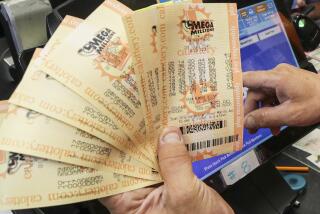Lawmakers Say Tougher Odds in Lotto Game Make It a Loser
- Share via
SACRAMENTO — As Lotto approaches its first big jackpot since California lottery officials changed the game in an attempt to attract more players, two legislative leaders are raising concerns that the move may have backfired and actually driven some regulars away.
Assemblyman Richard Floyd (D-Carson) and Sen. Ralph Dills (D-Gardena) said a decision by the California Lottery Commission to add four numbers to the field that players select from when buying a Lotto ticket has made it nearly twice as hard to win and appears to have discouraged betting.
“I think (lottery officials) made a dumb move,” said Floyd. “I think people are saying, ‘Hey, this is not a good bet.’ They keep talking about using good business practices but there is nobody over there that knows what a good business practice is; the thing is run by bureaucrats.”
The decline of interest in Lotto, he said, is demonstrated by the fact that sales used to be from $5 million to $6 million for each draw and have decreased to just under $5 million. Where it once took three drawings to reach a “super jackpot” of $30 million, he said, it now takes four or five draws. Drawings are held every Wednesday and Saturday.
Moreover, said Dills, who successfully pushed the Senate to pass a resolution urging the Lottery Commission to hold public hearings throughout the state before it altered the game, the change in odds is unfair to the gambling public.
“You’re likely to be hit by lightening sooner than you’ll hit that jackpot,” he said. “It’s terrible. It’s an insult to the people of the state of California. Worse than that, it panders to the worst elements of human weakness. They sell the idea of get-rich-quick at the same time they increase the number of times you can’t win.”
Floyd and Dills head legislative committees that oversee the lottery but lack authority to prevent changes in lottery games.
While acknowledging that the number of players is down considerably, lottery officials say it has nothing to do with changes they instituted June 21. And they insisted it is far too early to measure the effect of the change on lottery sales.
“You can’t look at this tiny bit of history and draw any conclusions,” said Joanne McNabb, lottery communications manager.
McNabb said it has been the experience of lotteries throughout the country that lotto playing declines when the number of super jackpots--those over $30 million--dwindles. In California, there were no super jackpots from September, 1989, when the pot reached $56 million, until February, 1990, when it rose to $68 million.
Saying the best way to increase sales was to produce more super jackpots, lottery officials decided that as of June 21 players would select six numbers from a field of 53 instead of 49. The change worsened the chance of winning from 1 in 14 million to 1 in 23 million. They said the move increased the likelihood of roll-overs from one drawing to the next, producing bigger jackpots.
“I know how it sounds like this is a stupid thing to do (make it harder to win),” said McNabb, adding that what attracts people is not the odds but “ . . the excitement of the jackpot.”
The first super jackpot since the change began building July 7. By this week it had reached $20 million. If there was no winner from Wednesday night’s drawing and the game rolls over once again, officials expect the jackpot to reach $30 million by Saturday. At that point, officials expect a frenzy of ticket buying--they call it “Lotto fever”--that boosts sales dramatically and keeps the lottery’s computer terminals constantly busy.
LOTTO NUMBERS: B1
More to Read
Go beyond the scoreboard
Get the latest on L.A.'s teams in the daily Sports Report newsletter.
You may occasionally receive promotional content from the Los Angeles Times.









